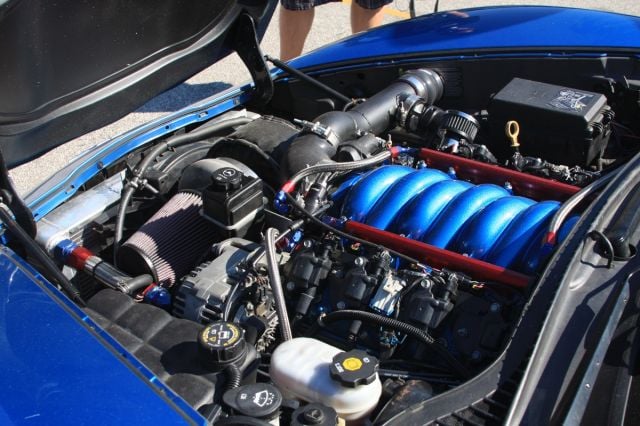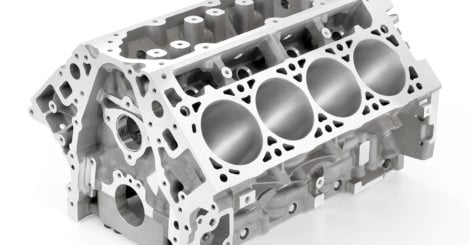 [1] Unless you’ve been living under a rock, then you already know all about the new Gen V small block from GM [2]– 6.2L, variable valve timing, displacement on demand, direct injection, 11.5:1 compression, and around 450 horsepower. With stats like that, the excitement surrounding this engine is well deserved. It’s been 15 years since the last revolutionary small-block V8 design change from GM, and we all know that the Small Block, in whatever form it takes, will be the driving force in the GM performance arena. It’s serious business for us GM fans.
[1] Unless you’ve been living under a rock, then you already know all about the new Gen V small block from GM [2]– 6.2L, variable valve timing, displacement on demand, direct injection, 11.5:1 compression, and around 450 horsepower. With stats like that, the excitement surrounding this engine is well deserved. It’s been 15 years since the last revolutionary small-block V8 design change from GM, and we all know that the Small Block, in whatever form it takes, will be the driving force in the GM performance arena. It’s serious business for us GM fans.
A Eulogy To The LS?
After the initial excitement from reveal of the LT1, I’ll admit that I was left with a hint of sadness.
However, after the initial excitement from reveal of the LT1, I’ll admit that I was left with a hint of sadness. On October 24th, 2012, at 10:29 AM Central Time, Editor Mike Magda reported from the LT1 Reveal [2] “Officials just announced no further research on LS series engines. ‘This is the future of the small-block V8,’ officials stressed.” And with that, it was done. The end of production for the LS became a reality. No new LS engines would be developed, and all the designations we know and love – LS1, LS2, LS3, LS4, LS6, LS7, LS9, LSA – are all the ones there will ever be.
 [3]
[3]Things look promising for the new Gen V LT1, but only time will tell if it can reach the level of respect that the LS series has achieved.
We all knew this day was coming, but I didn’t expect to actually feel bad about it. Like many of you I found myself too wrapped up in the excitement over the possibilities of new LT1 to really think about the ending of an era in GM small block performance.
So is that it? Is this really the death of the mighty LSx, and all I’m writing here is just a eulogy?
Not a chance.
The New Universal Engine
Corvettes, Camaros, Mustangs, Jeeps, Dune Buggies, Boats - the LS has become the 'Universal Engine'.
There is little doubt in anyone’s mind that the LS has effectively replaced the original small block Chevy as the “universal” engine. You can find them in everything from C6 Corvettes to a shade-tree swappers’ Toyota Celica, [6] Willys Jeep [7], or even a “lowly” Ford Fairmont [8]. Thanks to the literally millions of LS vehicles that GM produced during the engine’s 15+ year production run, we’ll enjoy swapping LS engines into projects for a very long time – in the same way gearheads have enjoyed the good ‘ole SBC for decades. Beyond that, it almost seems unnecessary to mention that the LS aftermarket is absolutely booming, and won’t be going away anytime soon. There will still be a steady flow of new LSX parts and engines from Chevrolet Performance, and dozens of other great companies.
The Familiar Small Block
Now, as much as we love new technology and new parts that can make us go faster, it’s no secret that we performance enthusiasts can be resistant bunch when it comes to big changes. It’s interesting to watch the negative backlash against the Gen V that’s already started up (mostly against the designation “LT1” – which we’ll remind originated in 1970 with the “LT-1” 370 horsepower 350 CI small block. A great engine by all accounts.). Let’s not forget that the LS1 was given essentially the same reception by enthusiasts in 1997 – with accusations of being “ugly” and “under powered”.
The LT1 is a clean-sheet design, but you can clearly see the influence the LS had on the newest small block Chevy
But the LT1 is more familiar than some might think. It’s still a tried-and-true cam-in-block, pushrod engine with a 4.4-inch bore spacing and two valves per cylinder – exactly like original small block and the LS. Heck, the LT1 even looks like a variant of the LS series. I can almost see it now; in 40 years when they are releasing the C11 Corvette, rumors will be popping up about a new engine designation that gives a “nod to the past”; an all-new LS1. (Electrical? Fuel Cell? Who knows…)
What Does The LT1 Mean For The LSX Movement?
Another possibility is that the LS will remain the max-performance engine of choice.
But for now, it’s tough to say what effects the new LT1 will have on the LS movement, if any. It’s likely that it won’t have any effect at all in the short-term. But as the years go on, and the aftermarket for the LT1 gets up and running, the big-ballers will chase the next hot thing, and prices will come down LS related goodies – meaning more access to better LS speed parts for you and me. Another possibility is that the LS will remain the max-performance engine of choice as the aftermarket and tuners struggle to crack the more complex ECU of the LT1. The inability to tune could effectively leave forced induction (and huge power) off the table with the new engine. “Forget this – lets just drop in a turbo LS…” could quickly become the speed junkie’s mantra.
Any way you look at it, we’re just getting started.




